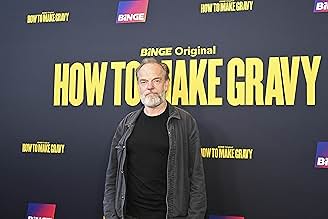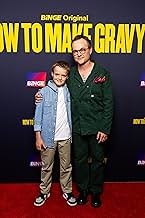Añade un argumento en tu idiomaA feature film adaptation of Australian music legend Paul Kelly's classic song, 'How to Make Gravy'.A feature film adaptation of Australian music legend Paul Kelly's classic song, 'How to Make Gravy'.A feature film adaptation of Australian music legend Paul Kelly's classic song, 'How to Make Gravy'.
- Dirección
- Guión
- Reparto principal
- Premios
- 1 premio y 15 nominaciones en total
Reseñas destacadas
"How To Make Gravy," directed by Nick Waterman and co-written with Meg Washington, is a poignant and beautifully crafted adaptation of Paul Kelly's iconic Christmas song.
The film delves into the emotional complexities of family and redemption, bringing to life the characters immortalised in Kelly's lyrics. Daniel Henshall delivers a compelling performance as Joe, a newly imprisoned man grappling with the weight of his absence during the family's first Christmas without him.
Hugo Weaving's portrayal of Noel, a veteran prisoner who becomes a father figure to Joe, adds profound depth to the narrative, exploring themes of guidance and personal growth. The film's visual storytelling is enhanced by Edward Goldner's cinematography, which captures both the starkness of prison life and the warmth of familial bonds.
Samuel Dixon's synth score, complemented by Washington's original songs, enriches the film's emotional landscape, resonating with the larrikin soul of Kelly's deeply felt ditty.
"How To Make Gravy" stands as a testament to the enduring power of Kelly's songwriting, offering a fresh perspective on a beloved Australian classic. It is a must-watch for both fans of the original song and those seeking a heartfelt Christmas narrative that transcends traditional holiday storytelling.
The film delves into the emotional complexities of family and redemption, bringing to life the characters immortalised in Kelly's lyrics. Daniel Henshall delivers a compelling performance as Joe, a newly imprisoned man grappling with the weight of his absence during the family's first Christmas without him.
Hugo Weaving's portrayal of Noel, a veteran prisoner who becomes a father figure to Joe, adds profound depth to the narrative, exploring themes of guidance and personal growth. The film's visual storytelling is enhanced by Edward Goldner's cinematography, which captures both the starkness of prison life and the warmth of familial bonds.
Samuel Dixon's synth score, complemented by Washington's original songs, enriches the film's emotional landscape, resonating with the larrikin soul of Kelly's deeply felt ditty.
"How To Make Gravy" stands as a testament to the enduring power of Kelly's songwriting, offering a fresh perspective on a beloved Australian classic. It is a must-watch for both fans of the original song and those seeking a heartfelt Christmas narrative that transcends traditional holiday storytelling.
Paul Kelly's beloved Christmas song "How To Make Gravy" comes to life in Australian drama that transforms a simple musical narrative into a powerful exploration of family, separation, and redemption. The film takes the core story of Kelly's song-a man in prison, writing a letter home during the holiday season-and expands it into a deeply moving cinematic experience.
The protagonist, Joe, is serving time during the Christmas period, separated from his family and haunted by the memories of past celebrations. Kelly's song becomes more than just a musical backdrop; it's the emotional core of the narrative, with the lyrics serving as a structural blueprint for the film's exploration of loss, longing, and hope.
Cinematographically, the film captures the Australian Christmas with a raw, authentic touch. Scenes alternate between the claustrophobic prison environment and the warm, bittersweet family gatherings on the outside. The visual palette shifts between cold, institutional blues and the warm, nostalgic tones of family gatherings, creating a stark contrast that mirrors Joe's emotional landscape.
The performance at the heart of the film is extraordinary. The lead actor brings remarkable depth to Joe, capturing the complex emotions of a man separated from his loved ones during the most family-oriented time of the year. His portrayal goes beyond the simple narrative of the original song, exploring his own upbringing, and how its led to his incarceration, and his desperate desire for connection.
Music plays a crucial role, with Kelly's song serving as both inspiration and narrative thread. The film expands on the song's simple premise-a man teaching his brother how to make gravy-into a broader exploration of family traditions, forgiveness, and the small moments that define human relationships. Each of Meg Washington's musical moment feels like a direct extension of the character's inner world.
The supporting cast brings depth to the family dynamics. We see the impact of Joe's absence through the eyes of his family-the tension, the love, the complicated emotions of those left behind. The film doesn't simplify these relationships but presents them in all their messy, complicated reality.
The film brilliantly expands on Kelly's original song, transforming a four-minute musical narrative into a full-length exploration of family, loss, and the possibility of reconciliation. It captures something quintessentially Australian-the ability to find humor, hope, and connection even in the most challenging circumstances.
A deeply moving, authentically Australian film that will resonate with anyone who has ever felt separated from those they love, "How To Make Gravy" stands as a remarkable cinematic achievement, and an instant Australian classic.
The protagonist, Joe, is serving time during the Christmas period, separated from his family and haunted by the memories of past celebrations. Kelly's song becomes more than just a musical backdrop; it's the emotional core of the narrative, with the lyrics serving as a structural blueprint for the film's exploration of loss, longing, and hope.
Cinematographically, the film captures the Australian Christmas with a raw, authentic touch. Scenes alternate between the claustrophobic prison environment and the warm, bittersweet family gatherings on the outside. The visual palette shifts between cold, institutional blues and the warm, nostalgic tones of family gatherings, creating a stark contrast that mirrors Joe's emotional landscape.
The performance at the heart of the film is extraordinary. The lead actor brings remarkable depth to Joe, capturing the complex emotions of a man separated from his loved ones during the most family-oriented time of the year. His portrayal goes beyond the simple narrative of the original song, exploring his own upbringing, and how its led to his incarceration, and his desperate desire for connection.
Music plays a crucial role, with Kelly's song serving as both inspiration and narrative thread. The film expands on the song's simple premise-a man teaching his brother how to make gravy-into a broader exploration of family traditions, forgiveness, and the small moments that define human relationships. Each of Meg Washington's musical moment feels like a direct extension of the character's inner world.
The supporting cast brings depth to the family dynamics. We see the impact of Joe's absence through the eyes of his family-the tension, the love, the complicated emotions of those left behind. The film doesn't simplify these relationships but presents them in all their messy, complicated reality.
The film brilliantly expands on Kelly's original song, transforming a four-minute musical narrative into a full-length exploration of family, loss, and the possibility of reconciliation. It captures something quintessentially Australian-the ability to find humor, hope, and connection even in the most challenging circumstances.
A deeply moving, authentically Australian film that will resonate with anyone who has ever felt separated from those they love, "How To Make Gravy" stands as a remarkable cinematic achievement, and an instant Australian classic.
Paul Kelly's song becomes a feature film in telling a ballad about a father unable to express true emotions. Instead, to the distraught of his family (more importantly his son), he ends up in prison for a violent outburst on a family Christmas Day. This is where the journey begins for him, and Daniel Henshall plays it with an emotional depth that has you drawn into the conflicting character, along with Hugo Weaving back to form as the wise prisoner cook.
An Australian movie that brings back hope to the art of a perfectly two hour storytelling structure, thanks to a screenplay by Meg Washington (a most underrated Australian musician), and debut feature director, Nick Waterman, who really get the characters that embody the Aussie suburban culture. And what joy to see Paul Kelly make a cameo.
An Australian movie that brings back hope to the art of a perfectly two hour storytelling structure, thanks to a screenplay by Meg Washington (a most underrated Australian musician), and debut feature director, Nick Waterman, who really get the characters that embody the Aussie suburban culture. And what joy to see Paul Kelly make a cameo.
Why does everything have to be so sterile and safe?
It's like everyone has trauma and needs to do something bad before finding themselves and going to group therapy and everyone is happy again.
Had a lot of expectations for this but it is just another run of the mill hashtag trauma hashtag grief drama.
The whole thing was like a school play that was written by that over ambitious kid who thought he could write, with the odd naughty word that seemed to be added for some lame emphasis.
What has happened to entertainment?
It's trying to tackle deep issues with righteous lectures and it's badly predictable.
It's like everyone has trauma and needs to do something bad before finding themselves and going to group therapy and everyone is happy again.
Had a lot of expectations for this but it is just another run of the mill hashtag trauma hashtag grief drama.
The whole thing was like a school play that was written by that over ambitious kid who thought he could write, with the odd naughty word that seemed to be added for some lame emphasis.
What has happened to entertainment?
It's trying to tackle deep issues with righteous lectures and it's badly predictable.
An incredible movie, inspired by one of the most iconic Australian songs. This was such a heart breaking story that was subtle in all the right ways.
The performances of Hugo Weaving and Daniel Henshall are so authentic and they are able to portray a deep emotion behind every scene. The heartache and pain behind their eyes feels so real.
This could have easily been another Australian cinema fail but they have don't the song justice. Seeing an authentic Australian life on screen is so important and it's great to see the government invest in media like this.
It's also fun to hear an all-Aussie soundtrack to a movie.
Just beautiful.
The performances of Hugo Weaving and Daniel Henshall are so authentic and they are able to portray a deep emotion behind every scene. The heartache and pain behind their eyes feels so real.
This could have easily been another Australian cinema fail but they have don't the song justice. Seeing an authentic Australian life on screen is so important and it's great to see the government invest in media like this.
It's also fun to hear an all-Aussie soundtrack to a movie.
Just beautiful.
¿Sabías que...?
- CuriosidadesCameo: Paul Kelly plays the bus driver.
Selecciones populares
Inicia sesión para calificar y añadir a tu lista para recibir recomendaciones personalizadas
Detalles
- Duración2 horas
- Color
Contribuir a esta página
Sugerir un cambio o añadir el contenido que falta

Principal laguna de datos
What is the Spanish language plot outline for How to Make Gravy (2024)?
Responde

































